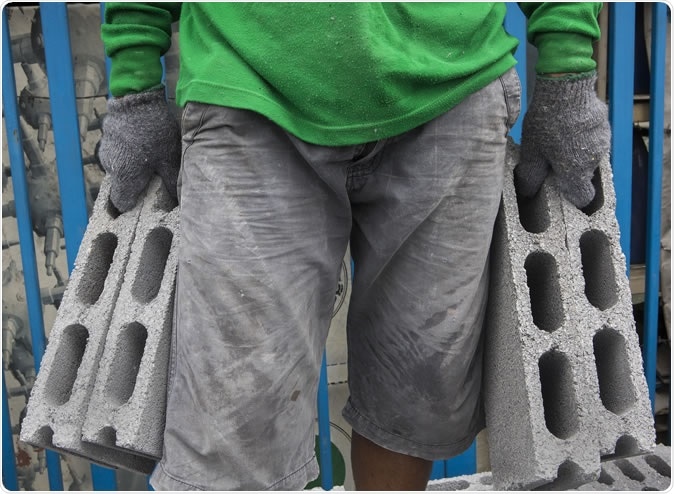Doing good hard work or exercising well is a tried-and-tested way to improve heart health – right? Well, not always, says a new study published in the journal Hypertension.
The researchers found that different types of exercise have significantly different levels of protection. And in fact, chronic strenuous work involving bearing heavy physical loads can lead to abnormal reactions to alterations in blood pressure, affecting normal heart rhythm and thus impairing health. They conclude, “This study has major public health implications for physical activity at work. We now want to expand our analysis to further explore the interactions between physical activity and the health status of people in the workplace.”
Physical activity and the cardiovascular system
The heart and blood vessels are intimately involved in any change in blood flow or blood pressure, because they carry blood to all the tissues of the body in varying proportions, according to the oxygen demand at the moment. Since exercise involves the skeletal muscles, it induces corresponding increases in the supply of blood to the muscles, the lungs, the heart and the brain, as well as other organs indirectly involved in keeping the body systems stable such as the autonomic nervous system and the sweat glands.
Physical activity has been long thought to offer the greatest protection against disease of the heart and blood vessels, by keeping the heart pumping and the blood flowing, as well as inducing relaxation of the blood vessels walls. Since heart and arterial disease are at present the number one killers among all diseases, prevention of these conditions could lead to a steep reduction in the number of deaths in people who are not otherwise sick. For this reason, all international associations concerned with cardiovascular health encourage physical fitness through regular activity.
The study
The current study was aimed at finding out whether this was a blanket concept, applying equally well to an intensive sport, occupational carrying of large loads, or simply taking a walk in the company of friends. It used data acquired from participants in the Paris Prospective Study III, which has been ongoing for the last decade. Over these 10 years, researchers in this French study have been following up on over 10,000 voluntary recruits, monitoring various health outcomes. All the volunteers were aged between 50 and 75 years, and all came via health visits at the Paris Health Clinic or Paris Preclinical Investigations, the IPC.

Image Credit: Sukpaiboonwat / Shutterstock
Each participant answered a questionnaire about how often, how long and how intensely they engaged in physical activity in three different situations: at work, in sporting contexts, and in their leisure time as in gardening. All participants were then tested for arterial sensitivity to changes in blood pressure. This was achieved with an advanced ultrasound technology that imaged the carotid artery, the large artery to the brain that passes through the neck. This technique, called echo tracking, can tell how sensitive the artery is to a sudden dip or increase in the blood pressure – an automatic reflex called the baroreflex. When baroreflex sensitivity decreases, it usually means the person is at higher risk for cardiac arrest and major medical conditions.
The researchers analyzed the echo tracking findings to separately assess two baroreflex components, the mechanical and the neural. The mechanical baroreflex occurs because the pressure on the arterial wall increases at each pulse when the blood pressure increases. It is measured via arterial stiffness values. On the other hand, neural baroreflex sensitivity occurs when nerve endings are triggered when the arterial wall moves outwards more, because of a stronger wave of arterial pulsation with higher blood pressure.
Abnormal mechanical baroreflex sensitivity usually accompanies arterial stiffening with age, and predicts age-linked heart disease. However, abnormal neural baroreflex sensitivity shows that the heart rhythm is likely to be affected, resulting in a higher risk of cardiac arrest.
The findings and implications
So how, if at all, does physical activity help? The researchers found that high-intensity sporting activity improves the neural baroreflex. However, at work, routinely carrying high physical loads seems to push up the risk of injuring neural as well as mechanical baroreflex sensitivity, causing the risk of cardiac rhythm disorders and damaging cardiovascular health overall.
The researchers say, “Our findings… suggest that chronic strenuous activity at work may be [harmful for health].” They intend to continue their study with greater numbers of people to confirm that the observed association holds good. They also want to look in more detail at how physical activity engaged in as a part of work affects the health of the workers.
Journal reference:
Association Between Occupational, Sport, and Leisure Related Physical Activity and Baroreflex Sensitivity, Rachel E. Climie, Pierre Boutouyrie, Marie-Cecile Perier, Edouard Chaussade, Mattieu Plichart, Lucile Offredo, Catherine Guibout, Thomas T. van Sloten, Frederique Thomas, Bruno Pannier, James E. Sharman, Stephane Laurent, Xavier Jouven, Jean-Philippe Empana, https://www.ahajournals.org/doi/10.1161/HYPERTENSIONAHA.119.13461